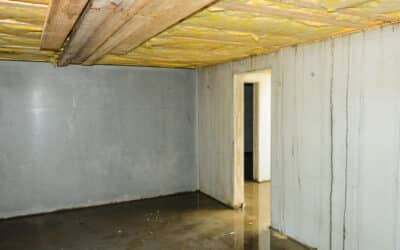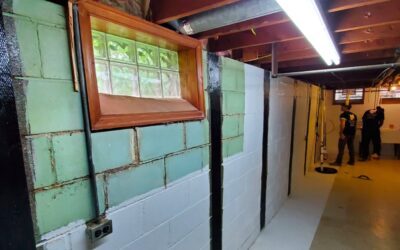Over time, your home’s foundation is bound to start showing its age. Basement walls can crack for many reasons, from natural settling to shifts in the soil, water pressure, and even breakdown in the materials used during construction.
While some small cracks can be relatively harmless, others signal more serious structural issues that could compromise the safety of your home if left unaddressed.
Why Basement Walls Crack
Many external and internal factors can cause breakage in your basement walls, such as:
- Soil Pressure and Hydrostatic Pressure: When soil around your home absorbs water from rainfall or irrigation, it expands and exerts pressure on the basement walls. Over time, this continuous force can cause cracks to develop, especially in older or weaker walls.
- Poor Drainage: Inadequate drainage systems, such as faulty gutters or improper downspouts, can lead to water pooling around your foundation. As water builds up, the surrounding soil becomes saturated, putting more pressure on the walls.
- Settling and Foundation Movement: This natural process leads to cracks in the basement walls, especially if the foundation was not built on stable ground.
- Temperature Fluctuations: Concrete and other materials may contract during colder months, and then expand in warmer months. This cycle can weaken the structural integrity of basement walls, leading to cracks over time.
- Concrete Shrinkage: When concrete cures, it naturally shrinks. Minor shrinkage cracks may appear in newer homes, which is typically not a structural concern but can still be problematic if water leaks through these cracks.
DIY Solutions for Minor Basement Wall Cracks
If the cracks in your basement walls are hairline or small vertical cracks, you may be able to address them yourself with the right tools and materials. Do this practical DIY basement wall crack repair to patch up minor breaks in your walls:
- Clean the Crack: Use a wire brush or a similar tool to clean the area around the crack. Remove any loose debris to ensure the patching material adheres well.
- Fill the Crack with Epoxy or Polyurethane Foam: For small cracks, an epoxy or polyurethane foam can effectively seal the crack and prevent water from entering. Epoxy is ideal for structural repairs, as it hardens and reinforces the wall. Polyurethane foam expands to fill the space, making it a good waterproofing option.
- Use Hydraulic Cement for Water-Sealing: Hydraulic cement is a quick-setting material that expands as it hardens, effectively sealing cracks against water. Simply mix the cement, apply it to the crack, and allow it to cure.
When to Call the Professionals
While DIY solutions can temporarily address minor cracks, serious structural issues require professional intervention. Here are some signs that it’s time to involve experienced professionals like our team at Summit Basement Company:
- Widening Cracks: If you notice that cracks are widening over time, it’s an indication of ongoing structural movement, which a professional should evaluate.
- Horizontal or Stair-Step Cracks: Both of these types of cracks suggest that the basement wall may be buckling due to external pressure or foundation settling, which can compromise your home’s stability.
- Persistent Water Seepage: If water continues to seep through your DIY repairs, it means there’s an underlying drainage or waterproofing issue.
- Bulging Walls: If your basement wall appears to bow or bulge, it’s a clear sign of serious structural strain.
- Musty Smell or Mold Growth: Persistent dampness or mold indicates ongoing moisture infiltration, which can lead to more severe structural and health issues.
Professional Solutions for Basement Wall Cracks

- Wall Anchors: Wall anchors can stabilize and reinforce bowing basement walls due to soil pressure.
- Carbon Fiber Reinforcement: This technique involves applying carbon fiber straps to cracked or weakened walls.
- Epoxy Injection for Structural Repair: For cracks that affect structural integrity, epoxy injection is a professional-grade solution.
- Waterproofing Systems: A professional can install a waterproofing system, which may include interior or exterior drainage solutions and sump pumps, to ensure that water doesn’t reach the foundation again.
Why You Should Leave It To The Professionals
While DIY repairs can be helpful for minor cracks, significant issues need a skilled hand. Summit Basement Company offers extensive experience and knowledge in handling structural and waterproofing issues, ensuring your basement stays dry and your foundation remains stable.
If you’re noticing cracks in your basement walls, don’t hesitate to reach out to Summit Basement Company. We’ll inspect the problem, explain your options, and offer expert solutions tailored to your needs.


